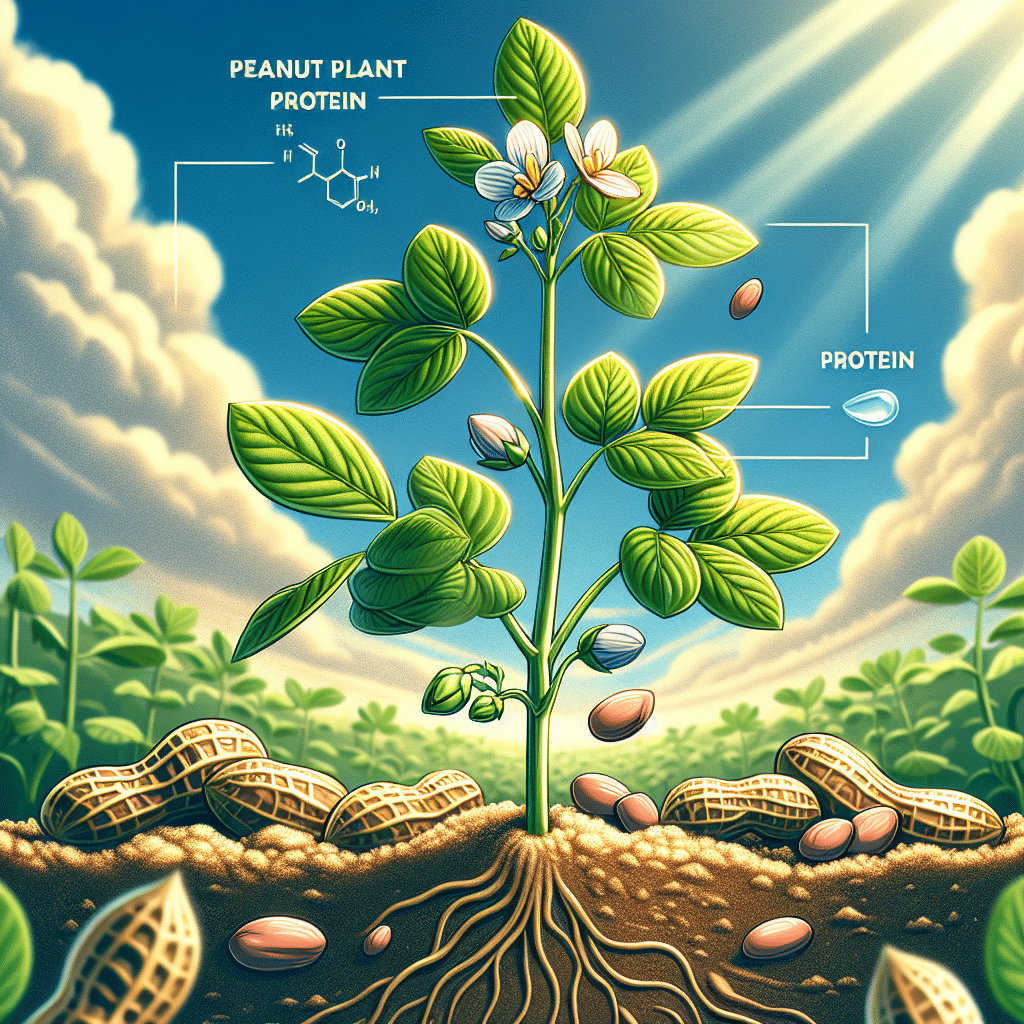Peanut Plant Protein: Green Strength Source
-
Table of Contents
- Peanut Plant Protein: A Sustainable Source of Strength
- Understanding Peanut Plant Protein
- Nutritional Benefits of Peanut Protein
- Environmental Advantages of Peanut Protein
- Applications of Peanut Protein
- Case Studies and Statistics
- Challenges and Considerations
- Conclusion: Embracing Peanut Protein for a Healthier Future
- Discover ETprotein’s Premium Plant Proteins
Peanut Plant Protein: A Sustainable Source of Strength

As the global population continues to grow and the demand for sustainable food sources increases, plant-based proteins are gaining significant attention. Among these, peanut plant protein stands out as a green strength source that offers a multitude of health and environmental benefits. This article delves into the world of peanut protein, exploring its nutritional value, environmental impact, and potential applications.
Understanding Peanut Plant Protein
Peanuts, also known as groundnuts, are not only a popular snack but also a potent source of plant-based protein. The protein derived from peanuts is highly regarded for its amino acid profile, which is comparable to that of meat and dairy products. Peanut protein is extracted from the defatted peanut flour, which is a byproduct of peanut oil production, making it a sustainable choice.
Nutritional Benefits of Peanut Protein
Peanut protein is packed with essential nutrients that are vital for maintaining good health. Here are some of the key nutritional benefits:
- High-Quality Protein: Peanut protein contains all nine essential amino acids required by the human body, making it a complete protein source.
- Rich in Fiber: It is also high in dietary fiber, which aids in digestion and promotes a feeling of fullness, helping in weight management.
- Heart-Healthy Fats: Peanuts contain monounsaturated and polyunsaturated fats, which are beneficial for heart health.
- Minerals and Vitamins: They are a good source of vitamins E and B complex and minerals such as magnesium, phosphorus, and potassium.
Environmental Advantages of Peanut Protein
When it comes to sustainability, peanut protein is an eco-friendly option. Peanuts have a relatively low water footprint compared to other protein sources, and they can fix nitrogen in the soil, reducing the need for chemical fertilizers. This makes peanut cultivation less resource-intensive and more environmentally sustainable.
Applications of Peanut Protein
Peanut protein has a wide range of applications in the food industry. It can be used in:
- Protein bars and shakes
- Meat substitutes
- Dairy-free yogurts and cheeses
- Baked goods and confectionery
- Gluten-free products
Its versatility and neutral taste make it an excellent ingredient for various dietary needs, including vegan and gluten-free diets.
Case Studies and Statistics
Several studies have highlighted the benefits of incorporating peanut protein into the diet. For instance, research has shown that peanut consumption can help in managing blood sugar levels and reducing the risk of heart disease. Moreover, the global plant-based protein market is expected to reach $14.5 billion by 2025, with peanut protein playing a significant role in this growth.
Challenges and Considerations
Despite its benefits, there are challenges to consider when it comes to peanut protein. Allergies to peanuts are common and can be severe. Therefore, food manufacturers must ensure proper labeling and consider cross-contamination risks in facilities that process peanut products.
Conclusion: Embracing Peanut Protein for a Healthier Future
In conclusion, peanut plant protein is a green strength source that offers a sustainable and nutritious alternative to traditional animal proteins. Its environmental benefits, coupled with its versatility in food applications, make it an attractive option for consumers and manufacturers alike. By embracing peanut protein, we can move towards a more sustainable and health-conscious future.
Discover ETprotein’s Premium Plant Proteins
If you’re looking for high-quality peanut protein and other plant-based proteins, ETprotein is your go-to source. With a commitment to sustainability and quality, ETprotein offers a range of organic and non-GMO protein products that cater to various industries. Whether you’re in the food and beverage sector or looking for nutritional supplements, ETprotein has the right solution for you.
About ETprotein:
ETprotein, a reputable protein Chinese factory manufacturer and supplier, is renowned for producing, stocking, exporting, and delivering the highest quality organic bulk vegan protein and plant proteins. They include Organic rice protein, clear rice protein, pea protein, clear pea protein, pumpkin seed protein, sunflower seed protein, mung bean protein, peanut protein etc. Their offerings, characterized by a neutral taste, non-GMO, allergen-free attributes, cater to a diverse range of industries. They serve nutraceutical, pharmaceutical, cosmeceutical, veterinary, as well as food and beverage finished product distributors, traders, and manufacturers across Europe, USA, Canada, Australia, Thailand, Japan, Korea, Brazil, and Chile, among others.
ETprotein specialization includes exporting and delivering tailor-made protein powder and finished nutritional supplements. Their extensive product range covers sectors like Food and Beverage, Sports Nutrition, Weight Management, Dietary Supplements, Health and Wellness Products, and Infant Formula, ensuring comprehensive solutions to meet all your protein needs.
As a trusted company by leading global food and beverage brands and Fortune 500 companies, ETprotein reinforces China’s reputation in the global arena. For more information or to sample their products, please contact them and email sales(at)ETprotein.com today.












